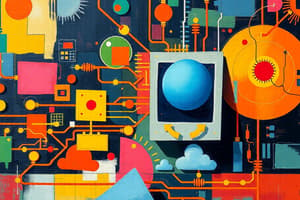Podcast
Questions and Answers
What best describes Information and Communications Technology?
What best describes Information and Communications Technology?
- Only the hardware used in computing environments.
- The study of technical writing and documentation.
- The use of telecommunications exclusively for broadcasting.
- The combination of telecommunications, computers, and broadcasting for processing information. (correct)
Which component of ICT includes devices like computers and routers?
Which component of ICT includes devices like computers and routers?
- Software
- Hardware (correct)
- Networks
- Applications
Which of the following is a benefit of ICT in education?
Which of the following is a benefit of ICT in education?
- Limitation of information to local databases.
- Reduction in the need for physical classrooms.
- Increased reliance on traditional textbooks.
- Access to e-learning platforms and resources. (correct)
What typical application is NOT associated with ICT?
What typical application is NOT associated with ICT?
Which trend in ICT focuses on the security of information systems?
Which trend in ICT focuses on the security of information systems?
Which career opportunity involves interpreting data for organizational decision-making?
Which career opportunity involves interpreting data for organizational decision-making?
What challenge of ICT deals with unequal access to technology?
What challenge of ICT deals with unequal access to technology?
Which future direction of ICT involves interconnecting devices?
Which future direction of ICT involves interconnecting devices?
What feature of mobile technology has increased significantly in recent years?
What feature of mobile technology has increased significantly in recent years?
Which of the following does NOT represent a component of ICT?
Which of the following does NOT represent a component of ICT?
Flashcards are hidden until you start studying
Study Notes
TLE - I.C.T (Information and Communications Technology)
-
Definition: Information and Communications Technology refers to the integration of telecommunications, computers, and broadcasting technologies for the purpose of processing and transmitting information.
-
Components:
- Hardware: Physical devices like computers, routers, and mobile devices.
- Software: Programs and applications that run on hardware, enabling functionality.
- Networks: Systems that connect devices, including LANs (Local Area Networks) and WANs (Wide Area Networks).
-
Applications:
- Communication: Email, instant messaging, and video conferencing tools.
- Data Management: Databases for storing and managing information.
- E-Commerce: Online buying/selling platforms and transactions.
- Content Creation: Tools for designing, writing, and publishing multimedia content.
-
Importance:
- Enhances Connectivity: Facilitates global communication and collaboration.
- Boosts Productivity: Automates processes and improves efficiency in various tasks.
- Promotes Learning & Education: Offers e-learning platforms and resources for knowledge acquisition.
-
Trends:
- Cloud Computing: Storing and accessing data over the internet to enhance flexibility and scalability.
- Mobile Technology: Increasing reliance on smartphones and tablets for everyday tasks.
- Big Data Analytics: Analyzing large datasets to inform decision-making.
- Cybersecurity: Protecting information systems from attacks and unauthorized access.
-
Career Opportunities:
- IT Support Specialist: Assisting users with technical issues.
- Web Developer: Creating and maintaining websites.
- Network Administrator: Managing and maintaining network systems.
- Data Analyst: Interpreting data to help organizations make informed decisions.
-
Challenges:
- Digital Divide: Disparity in access to technology and its benefits.
- Privacy Concerns: Protection of personal data in the digital age.
- Rapid Changes: Keeping up with fast-paced technological advancements.
-
Future Directions:
- Artificial Intelligence: Increased use of AI in various applications, enhancing automation and decision-making.
- Internet of Things (IoT): Expansion of interconnected devices that communicate and exchange data.
- 5G Technology: Improved connectivity and speed, enabling new applications in ICT.
Information and Communications Technology (ICT)
- Definition: ICT is a combination of telecommunications, computers, and broadcasting technologies for processing and transmitting information.
- Components:
- Hardware: Physical devices like computers, routers, and mobile devices.
- Software: Programs and applications that run on hardware to enable functionality.
- Networks: Interconnected systems that connect devices, including local area networks (LANs) and wide area networks (WANs).
- Applications:
- Communication: Email, instant messaging, and video conferencing tools.
- Data Management: Databases for storing and managing information.
- E-Commerce: Platforms and tools for online buying and selling transactions.
- Content Creation: Tools for designing, writing, and publishing multimedia content.
Importance of ICT
- Connectivity: Facilitates global communication and collaboration.
- Productivity: Automates processes and improves efficiency for different tasks.
- Learning and Education: Offers e-learning platforms and resources for knowledge acquisition.
Major ICT Trends
- Cloud Computing: Storing and accessing data over the internet for flexibility and scalability.
- Mobile Technology: Increased reliance on smartphones and tablets for everyday tasks.
- Big Data Analytics: Analyzing large datasets to make informed decisions.
- Cybersecurity: Protecting information systems from attacks and unauthorized access.
Career Opportunities in ICT
- IT Support Specialist: Providing technical assistance to users.
- Web Developer: Creating and maintaining websites.
- Network Administrator: Managing and maintaining network systems.
- Data Analyst: Interpreting data to help organizations make informed decisions.
Challenges in ICT
- Digital Divide: Disparity in access to technology and its benefits.
- Privacy Concerns: Protection of personal data in the digital age.
- Rapid Changes: Keeping up with rapidly evolving technological advancements.
Future Directions in ICT
- Artificial Intelligence (AI): Increasing use of AI in various applications for automation and decision-making.
- Internet of Things (IoT): Expansion of interconnected devices that communicate and exchange data.
- 5G Technology: Improved connectivity and speed, enabling new applications in ICT.
Studying That Suits You
Use AI to generate personalized quizzes and flashcards to suit your learning preferences.




